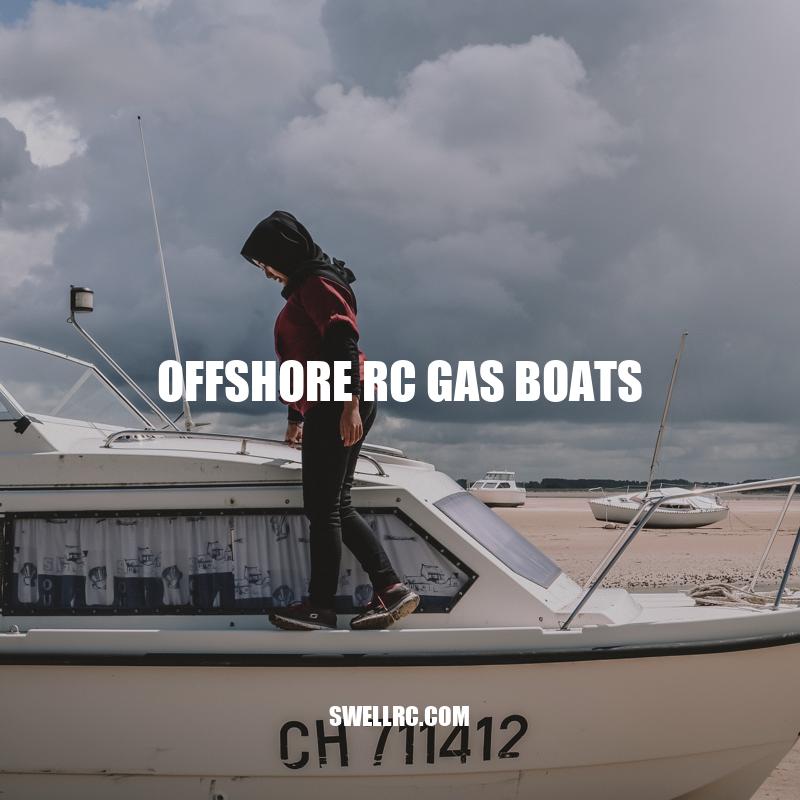Offshore RC Gas Boats: A Thrilling High-Speed Water Hobby
Offshore RC gas boats are the ultimate thrill machines for water enthusiasts. These miniature boats offer a high-speed racing experience that is unmatched by any other hobby. With powerful two-stroke gas engines, they can reach top speeds of over 50 mph and navigate through the toughest water conditions with ease. The history of offshore RC gas boats can be traced back to the early days of remote-controlled technology. Hobbyists quickly realized that they could modify existing model boat kits with gas engines, making them faster and more agile than ever before. Today, offshore RC gas boats have become a popular hobby worldwide, with racing competitions held around the globe. If you’re seeking a thrilling, high-speed adventure on the water, offshore RC gas boats are the perfect hobby for you. But with so many models, components, and customization options available, where do you start? In this article, we’ll explore the world of offshore RC gas boats and share some tips for those looking to get started in this exciting hobby.
History of Offshore RC Gas Boats
The first offshore RC gas boats were developed in the early 1970s, and they quickly became popular among hobbyists looking for a new and exciting challenge. Since then, offshore RC gas boats have evolved significantly, with improvements in technology and materials allowing for faster speeds and more advanced components. Some key events and trends in the history of offshore RC gas boats include:
- The first offshore RC gas boat races were held in California in the early 1970s, and they quickly became a popular event for hobbyists seeking thrills and excitement.
- In the 1980s and 1990s, advancements in materials such as fiberglass and carbon fiber allowed for lighter and stronger boats, which could reach speeds of up to 60 mph or more.
- In the 2000s and beyond, improvements in engine and propeller technology allowed for even faster and more powerful boats, with some models capable of reaching speeds of over 90 mph.
- Today, offshore RC gas boats are a global phenomenon, with racing events held in countries around the world.
If you’re interested in learning more about the history of offshore RC gas boats, there are several websites and forums that offer valuable information and resources. These include:
- The Offshore Electrics Forum, which features discussions on all aspects of offshore RC gas boats, including racing, building, and maintenance.
- The Model Powerboat Association, which promotes the development and competitive racing of model powerboats, including offshore models.
- Online retailers such as Amazon and HobbyKing, which offer a wide range of offshore RC gas boat models and accessories.
What is the history of the RC boat?
The history of RC boats dates back to the 1800s when model steamboats were first introduced. The first RC boat was introduced in 1898 by a man named Nikola Tesla. However, RC boats did not become popular until the 1960s when transistor radios became affordable and the technology allowed for remote control operation. Today, there are a wide variety of RC boats available on the market ranging from recreational models to intricate competition models. More information can be found on websites such as RC Planet or Horizon Hobby.
Components of Offshore RC Gas Boats
Offshore RC gas boats are built from multiple components that work together to propel the boat through the water at high speeds. The key components of an offshore RC gas boat include:
| Component | Description |
|---|---|
| Hull | The body of the boat, typically made of lightweight materials such as fiberglass or carbon fiber. |
| Engine | A two-stroke gas motor that powers the boat and provides its speed and acceleration. |
| Propeller | A high-performance propeller that transfers the power from the engine to the water, driving the boat forward. |
| Radio control system | A sophisticated system of electronics that allows the operator to steer the boat, control its throttle, and adjust its speed and direction. |
In addition to these key components, some offshore RC gas boats may include additional features or accessories, such as:
- Ballast systems to adjust the balance and stability of the boat based on weather and water conditions
- Custom paint designs and finishes
- CNC-machined aluminum components for improved performance and durability
- Tuned pipe exhaust systems for increased engine power and performance
As with any complex piece of machinery, proper maintenance and care is crucial to keep offshore RC gas boats running smoothly and performing at their best. Websites such as RC Boat Magazine and Offshore Electrics offer valuable resources and tips on maintaining and upgrading offshore RC gas boats.
What makes a offshore boat?
Offshore boats are boats designed for navigation in open waters, typically the ocean. They are often larger, heavier and more powerful than their counterparts intended for use inshore or in calm waters. Characteristics that make a boat suitable for offshore use include:
- A sturdy and reinforced hull to withstand rough waters and potential impacts from waves and debris.
- A deep V-shaped hull to cut through waves and provide a smoother ride.
- Advanced navigation and communication equipment to keep the crew safe and informed.
- Ample fuel and water storage for extended voyages.
- A comfortable and spacious interior for prolonged stays at sea.
Offshore boats need to be well-built and structurally sound to handle the rigors of open water. They typically have more advanced technology and amenities than other boats, as well as a higher price point. There are many brands and models of offshore boats available, with varying features and designs depending on the intended use. Some popular brands include Viking, Hatteras, and Boston Whaler. Information on these and other offshore boat brands can be found on websites such as Boat Trader and YachtWorld.
Racing Offshore RC Gas Boats
Racing offshore RC gas boats is a thrilling and competitive hobby that requires skill, precision, and strategy. Some important things to keep in mind when racing offshore RC gas boats include:
- Choosing the right course
- Finding the ideal tuning and balance
- Practicing effective steering techniques
- Cleaning and maintaining your boat
- Staying safe and following regulations
There are many racing events and competitions held around the world for offshore RC gas boats, including the World Championship RC Boat Races and the Gas Nationals. These events allow hobbyists to showcase their skills and meet other enthusiasts in the community. Websites such as the International Model Power Boat Association offer valuable resources and information on upcoming races and competitions for offshore RC gas boats.
How fast are the boats in offshore racing?
Offshore racing boats can reach incredible speeds, often exceeding 200 miles per hour. These high-octane races take place on the open ocean where rough waters and changing weather conditions can make for an exciting, but dangerous race.
Here are some of the fastest offshore racing boats:
| Boat | Top Speed (mph) |
|---|---|
| Miss Geico | 210 |
| Spirit of Qatar | 244 |
| Victory Team | 209 |
Offshore racing enthusiasts can follow the latest news, race schedules, and results on offshore-only.com, a leading website dedicated to the sport. Additionally, those interested in getting involved in offshore racing can find a range of products, including apparel, equipment, and boats, at offshoreperformance.com.
Choosing an Offshore RC Gas Boat
Choosing the right offshore RC gas boat is crucial for enjoying this exciting hobby to the fullest. To help you make an informed decision, consider the following when selecting a boat:
- Your skill level – beginners may want to start with an entry-level model that’s easy to operate and maintain, while experienced hobbyists may prefer a more advanced and customizable boat.
- Your budget – the cost of offshore RC gas boats can range from a few hundred dollars to thousands of dollars, so it’s important to set a budget that works for you.
- Your intended use – do you plan to race your boat, use it for recreation, or both? Depending on your goals, you’ll want to select a boat that’s suited to your purposes.
- The boat’s design and features – offshore RC gas boats come in various sizes, shapes, and designs, with different features such as adjustable trim tabs, water pickups and mufflers, and custom graphics. Consider what’s important to you and what features will enhance your experience.
- The engine type and power – offshore RC gas boats typically use two-stroke gas engines that can range from 23 to 50 cc. Consider the engine’s power and fuel efficiency when selecting a boat.
Some popular brands of offshore RC gas boats include Aquacraft, Pro Boat, and Traxxas. Websites such as RC Boats Guide offer comprehensive reviews and comparisons of various models and brands of offshore RC gas boats to help you make an informed decision.
What is the meaning of RC boat?
RC boat stands for Remote Control boat, which is a small, radio-controlled watercraft. RC boats are models of racing boats or other water vessels that can be controlled from a distance, usually operated through a handheld remote control. They come in various sizes and types, such as electric or gas-powered boats, and are made for different purposes including racing, leisure, or fishing.
If you’re interested in purchasing an RC boat, websites such as Amazon, Horizon Hobby, and Tower Hobbies offer a variety of options that cater to different preferences and budgets.
Maintaining Your Offshore RC Gas Boat
Proper maintenance is key to ensuring that your offshore RC gas boat remains in good condition and performs at its best. Here are some tips for maintaining your boat:
- Clean the boat regularly using water and soap. Avoid using abrasive materials that can scratch the hull or damage the decals and graphics.
- Lubricate moving parts, such as the prop shaft and cables, to ensure smooth operation and prevent corrosion.
- Check the engine and fuel system regularly for any signs of wear, damage, or fuel leaks. Replace any damaged parts or components as needed.
- Check the battery and electrical system regularly to ensure that the boat’s electronics are operating correctly. Replace damaged or worn batteries or components as needed.
- Inspect the hull for any cracks or damage that could compromise its integrity and performance. Repair any damage promptly to prevent further deterioration.
- Store your boat in a cool and dry place, away from direct sunlight and moisture. Cover the boat with a tarp or cover to protect it from dust and debris when not in use.
There are also many products and accessories available to help you maintain and customize your offshore RC gas boat. For example, Hull Hugr dock bumpers can protect your boat from bumps and scratches when docking, while specially designed radio control stands can help you work on your boat more easily. Brands such as Dubro and Sullivan offer a range of tools and accessories for maintaining and repairing your offshore RC gas boat.
Can you run RC boats in saltwater?
Yes, you can run RC boats in saltwater. However, it is important to keep in mind that saltwater can be more corrosive than freshwater and may require special care and maintenance for your RC boat. To ensure optimal performance and durability of your RC boat in saltwater, you may want to consider the following tips:
- Use appropriate materials for saltwater such as stainless steel and corrosion-resistant coatings
- Clean and rinse your RC boat after each use in saltwater to remove any salt deposits
- Use a waterproof sealant for electronic components
- Consider using a coating or lubricant to protect the motor from saltwater exposure
Some RC boat manufacturers offer models specifically designed for saltwater use, such as the Traxxas Spartan and the Pro Boat Sonicwake. It is important to check the manufacturer’s recommendations and consult the user manual for proper care and maintenance instructions.
For more information on running RC boats in saltwater, you can visit websites such as RC Boat Magazine and RC Planet.
Conclusion
Offshore RC gas boats are a thrilling hobby that combines the excitement of high-speed racing with the fun of building and maintaining miniature boats. Whether you’re a beginner or an experienced hobbyist, there’s something to enjoy in the world of offshore RC gas boats.
By selecting the right boat, mastering the controls, and maintaining your craft in top condition, you can experience the rush of racing across the water at high speeds. With proper maintenance and care, your offshore RC gas boat can provide you with years of enjoyment and excitement.
Be sure to visit online communities like rcgroups.com and rcuniverse.com, where you can connect with other offshore RC gas boat enthusiasts, share experiences, and learn from one another. You can also find a wealth of information and resources online, including tutorials, guides, and product reviews to help you get started in this exciting hobby.
So what are you waiting for? Get out there and start exploring the world of offshore RC gas boats!



